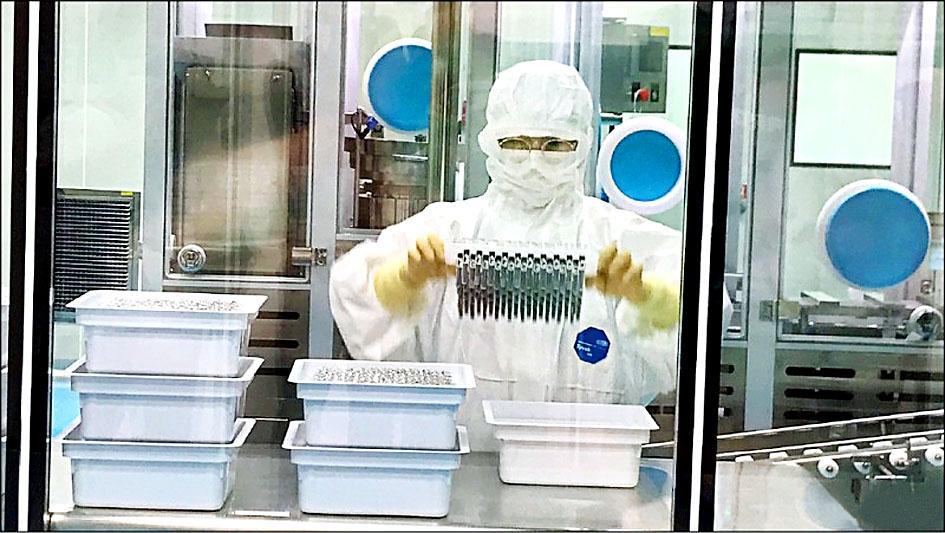The Food and Drug Administration (FDA) yesterday announced emergency use authorization (EUA) standards for locally developed COVID-19 vaccines, just hours before Medigen Vaccine Biologics Corp (高端) announced its phase 2 trial results.
The standards include safety data from at least 3,000 subjects and efficacy test results at least on par with the AstraZeneca vaccine, the FDA said.
The standards were determined after a year of discussions with experts in the clinical, statistical, pharmaceutical, manufacturing, public health and other related fields, it added.

Photo: Huang Mei-chu, Taipei Times
The EUA review is to focus on two main points: safety and efficacy, Medical Products Division deputy head Wu Ming-mei (吳明美) told reporters.
Efficacy would be difficult to assess, as clinical trials were held while Taiwan did not have any community transmission, Wu said.
This means the subjects did not have contact with the virus, making it less clear whether the vaccine had the intended effect compared with the control group, she added.
The review would therefore refer to a criteria the WHO began discussing earlier this year called immunogenicity, which measures the type of immune responses triggered by a vaccine and their magnitude over time, she said.
This would involve measuring the level, or titer, of neutralizing antibodies in the body after vaccination to determine efficacy, she added.
To determine the appropriate level, the FDA is to commission Ministry of Health and Welfare hospitals to conduct studies comparing the effect of domestic vaccines with that of foreign vaccines, Wu said.
Researchers are to put together a control group of 200 Taiwanese who have received both doses of the AstraZeneca vaccine since rollout began in March, she said.
If the neutralizing antibody titer among subjects who received the domestic vaccine are at least as high as that of the control group, then the vaccine would be considered effective, she added.
As for the safety part of the evaluation, the FDA would require researchers to follow up with 3,000 or more clinical trial participants for at least one month after receiving their last dose, Wu said.
The report must then compile safety data from the subjects followed for a median of at least two months, she said, adding that it must include a population study for people older than 65.
Medigen was yesterday set to unblind participants of the second stage of clinical trials for its COVID-19 vaccine, leading some to speculate over potential insights into its efficacy.
The unblinding would only reveal if there were differences between the subjects who received a vaccine and those who received a placebo, Wu said.
The results must still be sent to the FDA before it can begin EUA procedures, she added.

A Chinese aircraft carrier group entered Japan’s economic waters over the weekend, before exiting to conduct drills involving fighter jets, the Japanese Ministry of Defense said yesterday. The Liaoning aircraft carrier, two missile destroyers and one fast combat supply ship sailed about 300km southwest of Japan’s easternmost island of Minamitori on Saturday, a ministry statement said. It was the first time a Chinese aircraft carrier had entered that part of Japan’s exclusive economic zone (EEZ), a ministry spokesman said. “We think the Chinese military is trying to improve its operational capability and ability to conduct operations in distant areas,” the spokesman said. China’s growing

Nine retired generals from Taiwan, Japan and the US have been invited to participate in a tabletop exercise hosted by the Taipei School of Economics and Political Science Foundation tomorrow and Wednesday that simulates a potential Chinese invasion of Taiwan in 2030, the foundation said yesterday. The five retired Taiwanese generals would include retired admiral Lee Hsi-min (李喜明), joined by retired US Navy admiral Michael Mullen and former chief of staff of the Japan Self-Defense Forces general Shigeru Iwasaki, it said. The simulation aims to offer strategic insights into regional security and peace in the Taiwan Strait, it added. Foundation chair Huang Huang-hsiung

PUBLIC WARNING: The two students had been tricked into going to Hong Kong for a ‘high-paying’ job, which sent them to a scam center in Cambodia Police warned the public not to trust job advertisements touting high pay abroad following the return of two college students over the weekend who had been trafficked and forced to work at a cyberscam center in Cambodia. The two victims, surnamed Lee (李), 18, and Lin (林), 19, were interviewed by police after landing in Taiwan on Saturday. Taichung’s Chingshui Police Precinct said in a statement yesterday that the two students are good friends, and Lin had suspended her studies after seeing the ad promising good pay to work in Hong Kong. Lee’s grandfather on Thursday reported to police that Lee had sent

BUILDUP: US General Dan Caine said Chinese military maneuvers are not routine exercises, but instead are ‘rehearsals for a forced unification’ with Taiwan China poses an increasingly aggressive threat to the US and deterring Beijing is the Pentagon’s top regional priority amid its rapid military buildup and invasion drills near Taiwan, US Secretary of Defense Pete Hegseth said on Tuesday. “Our pacing threat is communist China,” Hegseth told the US House of Representatives Appropriations Subcommittee on Defense during an oversight hearing with US General Dan Caine, chairman of the Joint Chiefs of Staff. “Beijing is preparing for war in the Indo-Pacific as part of its broader strategy to dominate that region and then the world,” Hegseth said, adding that if it succeeds, it could derail